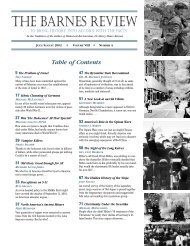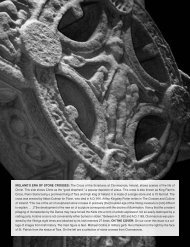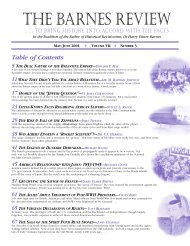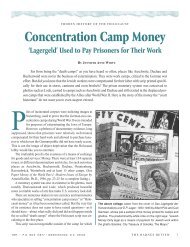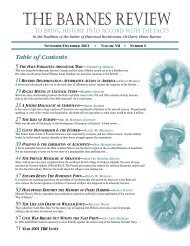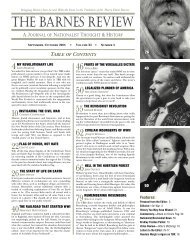Table of Contents - The Barnes Review
Table of Contents - The Barnes Review
Table of Contents - The Barnes Review
Create successful ePaper yourself
Turn your PDF publications into a flip-book with our unique Google optimized e-Paper software.
with the persecution <strong>of</strong> Christians in Persia, after the reinstating<br />
<strong>of</strong> Zoroastrianism there, economic prosperity happened to<br />
reign in both empires. Chlorus handles himself with humanity<br />
during the ordeal, bringing down only the physical structures <strong>of</strong><br />
the Christians. Diocletian fails to stabilize the silver coinage, so<br />
<strong>of</strong>ficially he introduced the gold standard <strong>of</strong> the international<br />
bankers.<br />
Diocletian, 305, resigned and obliges Maximianus to do so.<br />
Galerius and Chlorus are elevated to senior and junior augusti<br />
respectively. Chlorus being absent, Galerius ordained two caesars,<br />
neither being a relative to himself or to Chlorus. Flavius<br />
Severus, an evil man, is made the west caesar and as Galerius is<br />
about to ordain the other, the crowds turn their eyes upon<br />
Constantine. Galerius pushed him aside and guided forth Maximinus<br />
Daia, a nephew <strong>of</strong> base character. Constantine sought to<br />
leave in 305; some try to say he escaped. Quickly he joined his<br />
father to reconquer Britain. Chlorus governed his quarter <strong>of</strong> the<br />
empire out <strong>of</strong> Eboracum (York). Loved by pagans and Christians<br />
in the West, he admonished Constantine to be fair with<br />
Christians as they were clean and made responsible citizens. In<br />
a year Chlorus died. Constantine’s army raised him to augustus<br />
while Galerius recognized him only as caesar. Maximianus, in<br />
307, recognized Constantine the west augustus, obliged him to<br />
divorce his Minervina <strong>of</strong> non-status background, and gives him<br />
his daughter Fausta in marriage.<br />
In Rome the people, agitating for their capital back, in 306,<br />
declared Maxentius the augustus. For both Maxentius and<br />
Constantine to be west augusti by act <strong>of</strong> Maximianus meant that<br />
Maximianus with secret backing wished to get rid <strong>of</strong> Galerius.<br />
Galerius made Severus the caesar for the west. Maximianus and<br />
Maxentius provoked Galerius and Severus. Severus crossed into<br />
Italy in 307, and his troops, suddenly and somehow being<br />
instilled with fear <strong>of</strong> sacrilege to invade sacred soil, at the last<br />
moment abandoned him to be seized and executed. Humiliated,<br />
Galerius recognized Constantine the west augustus.<br />
Maximianus petitioned Diocletian in 308, both retired, to<br />
allow him back his throne, but Galerius and Diocletian rejected<br />
him. His son refused to abdicate in his favor and, as a result, his<br />
troops mutinied. Escaping to Gaul, he conspired with his daughter<br />
to murder Constantine, his son-in-law, to take his title and<br />
power. She told her husband. Maximianus escaped and in Marseilles<br />
“strangled himself,” or was executed by someone. Germanic<br />
border uprisings, with his demise, become quieted.<br />
Maxentius, evil as his father and eyeing the western<br />
provinces, then announced he would avenge his father. Constantine<br />
moved quickly across Gaul. His adversary had 188,000<br />
men. He had 108,000, but half must defend the Rhine. His soldiers,<br />
suddenly, too, see as sacrilege and tremble at the prospect<br />
<strong>of</strong> violently entering Italian soil and laying siege to the sacred<br />
Capitolium Hill. His generals remember Severus’s fate.<br />
Meanwhile Galerius conceded to allow Christians to worship<br />
as long as they prayed for the emperor—a condition<br />
Orthodox Christianity held through Ottoman Muslim and athe-<br />
48 N O V E M B E R / D E C E M B E R 2 0 0 3<br />
ist communist rule until today. Galerius then restored all properties<br />
to the Christians. He died in 311, perhaps poisoned, as his<br />
favorites, Licinius and Maximinus Daia, split his domain.<br />
Constantine and his army, Christians and pagans, in high<br />
noon see a “cross” <strong>of</strong> light hovering above the sun with the inscription<br />
in Greek “by this sign conquer.” That night Constantine<br />
dreams <strong>of</strong> the Christ <strong>of</strong> God and the imperial standard adapted<br />
to the celestial sign. <strong>The</strong> new standard, the “labarum,” is <strong>of</strong> a<br />
gold-plated spear, a gold-plated crossbar, a suspended square<br />
piece <strong>of</strong> purple silk cloth with the gold-threaded Greek “Chi Rho”<br />
monogram, surmounted with a wreath.<br />
Constantine enters Italy with 40,000 men, bearing shields<br />
with the “Chi Rho,” each unit led with a “labarum.” Taking Torino,<br />
Milano and Verona, he marched to Rome. Constantine, marched<br />
out across the Tiber in full array and defeated Maxentius. Fleeing<br />
toward Rome, Maxentius falls <strong>of</strong>f the Milvian Bridge and<br />
drowned.<br />
<strong>The</strong> next day, October 28, 312, Constantine enters Rome,<br />
the sole emperor <strong>of</strong> the West. He keeps to a moderate policy, for<br />
he is emperor <strong>of</strong> all Romans <strong>of</strong> all religions. He remains unbaptized.<br />
He maintains the ancient pagan title <strong>of</strong> pontifex maximus,<br />
as it is an authoritatively managerial title <strong>of</strong> state. In his triumphal<br />
ceremony he does not sacrifice to the pagan gods; nor<br />
participate in the yearly equestrian procession <strong>of</strong> ascending the<br />
Capitolium to <strong>of</strong>fer sacrifices to the gods per ancient custom. He<br />
donated pieces <strong>of</strong> imperial land to build churches and granted<br />
privileges to the church. He warns the clergy: “Do not be dis-<br />
Pagan practices meanwhile were manifesting increased activity in secret rites,<br />
superstitious practices, sorcery, narcotic hallucinations, enchantments,<br />
all <strong>of</strong> which by older laws were, as questionable practices, forbidden.<br />
tracted by any secular [treacherous] <strong>of</strong>fers. When you are free [<strong>of</strong><br />
oaths, obligations to other men] to render the highest service to<br />
the Divinity you bestow a great benefit upon the state.”<br />
<strong>The</strong> senate proclaims Constantine the augustus <strong>of</strong> the<br />
west, builds an arch <strong>of</strong> triumph and sets up a monument with his<br />
statue holding the victory-delivering spear with cross-bar and<br />
with the Greek inscription at the base, “By this saving sign, the<br />
true expository <strong>of</strong> bravery, I freed your city from tyranny and<br />
restored liberty to the senate and the people <strong>of</strong> Rome.” All his<br />
inscriptions avoid mention <strong>of</strong> ancient gods or <strong>of</strong> the Christian<br />
God, favoring the abstract “divinity” as a conciliatory gesture.<br />
That the Greek language is employed is not shocking, for the<br />
inhabitants <strong>of</strong> Rome have been bilingual for 400 years. Matters<br />
<strong>of</strong> law and order are in Latin; matters <strong>of</strong> philosophy and now <strong>of</strong><br />
Christianity were in Greek.<br />
Constantine and Licinius, in 313, met in Milan. Constantine<br />
gave his sister in marriage to Licinius as the two eventually<br />
settled matters <strong>of</strong> state and proclaimed the Edict <strong>of</strong> Milan for<br />
the tolerance <strong>of</strong> all religions. From this, the Jews lose their<br />
uniquely special status. <strong>The</strong> empire’s easternmost co-emperor,<br />
Maximinus Daia, while Licinius is absent from the Danube,<br />
feigned agreement, scheming under clandestine advisement and<br />
backing to be the sole emperor <strong>of</strong> the East. Surging across the<br />
Bosporus, he was repulsed by Licinius at Adrianople, and again<br />
at Byzantium. Returning to Nicomedia, he then killed himself.<br />
Two emperors were left. Licinius, in the east, now being



